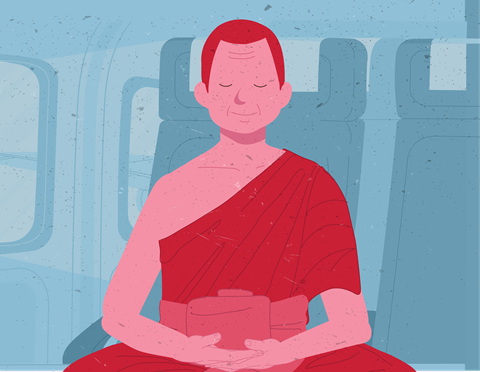Critics have dubbed the latest social media craze idiotic, but Lucy Peppiatt argues that it has much in common with ancient spiritual disciplines

I don’t know if you’ve heard of ‘raw-dogging’. It’s the practice of enduring a long-haul flight with no films, no music, no sleep and sometimes no food, drink or even toilet breaks!
Apparently, it’s mostly young men taking part in this intriguing practice, and then posting about their achievements on social media. One raw-dogging enthusiast recently took to Instagram to boast that he’d achieved a “personal best”, enduring a 13-hour journey without any in-flight entertainment at all. No doubt there’s an element of competition involved, hence the sharing on socials but, at its heart, it’s really a display of fortitude. According to a BBC report: “For these men, the appeal seems to be the opportunity to prove their resilience and self-control.”
It’s easy to be dismissive of this kind of showboating. It is, in essence, pretty pointless, if not detrimental to our health. One GP called raw-doggers “idiots” and I understand, from a doctor’s point of view, why it must seem plain silly. At least drink some water!
But when this kind of trend takes hold, I think there are deeper things going on. It also strikes me as nothing particularly new. In fact, it’s rooted in something ancient.
Deny yourself
Raw-dogging sits firmly within the tradition of asceticism, which is defined by the Oxford Dictionary as: “severe self-discipline and avoiding all forms of indulgence”. All religions have traditions of asceticism. The Christian faith has a strong tradition of self-denial (Matthew 16:24; 19:21), most notably taking off with the Desert Fathers and Mothers, a movement among (mostly wealthy) men and women beginning in the third century. These people felt called to renounce their wealth and possessions and withdraw to the desert. Having very little contact with anyone, they lived in caves or huts and survived on bread, water, salt and a few vegetables.
This movement, which formed the basis of monasticism, was marked by withdrawal, self-denial, renunciation and isolation – and many Christians since have followed this pattern, taking time to contemplate the nature of God, pray, purify their hearts and be formed into Christ-likeness.
The whole of Christian history is marked by the denial of creature comforts for the sake of drawing close to God
The whole of Christian history and the tradition of spiritual formation is marked by asceticism and the denial of creature comforts for the sake of drawing close to God. And, interestingly, within this tradition, there would frequently be those who went to an almost unbelievable extreme: chaining their bodies to rocks, eating only grass, living on a pillar for years, spending long periods in solitary confinement, intentionally inflicting pain on the body and abandoning personal hygiene.
Sounds very like a version of raw-dogging to me. But what is being expressed in these extreme versions of asceticism, and what does the Bible have to say about it all?
Three lessons
First of all, the Bible does encourage us to deny ourselves some worldly creature comforts, not simply to prove we can do it, but to focus on God. In other words, denying ourselves food (fasting), or abstaining from social media or entertainment is not just for the purpose of exerting control over the things that sometimes control us, but also to free our minds and hearts to contemplate God and his goodness, immerse ourselves in scripture and pray for the world.
Secondly, we can’t be changed by our own efforts. Dallas Willard is, in my view, still the best person to read if you want to understand not just the how of spiritual disciplines, but the why. Spiritual formation has become a trend in the Church. This is a good thing – more prayer, reading of scripture and solitude will be beneficial for us all. But we must remember that spiritual disciplines on their own will not transform us into Christ-likeness. They will not unlock blessing. They are not a measure of how holy we are. Neither will they do the work of changing our hearts. This requires submission to the lordship of Jesus, love of him and obedience to him, and inviting the Holy Spirit to work in us.
Thirdly, our journey of asceticism is not for social media. Jesus warned his disciples not to make it obvious when fasting, but to do it privately. Then God: “who sees what is done in secret, will reward you” (Matthew 6:16-18). It is the same with prayer (v5-6) and giving (v4) – the Bible tells us they are all to be done discreetly and without fanfare. Showboating is not an option!
The purpose
Self-denial, self-control and simplicity are good things. I think I understand why young men in particular are attracted to raw-dogging: it gives them a sense of relief to know that they can take control of the things that sometimes control them. I found myself agreeing with the business psychologist, Danielle Haig, who says she can see why people: “would want to spend time in quiet reflection, allowing their mind to wander, in our increasingly fast-paced, technology-driven world”.
Haig’s words should sound familiar to us as Christians. We have a long history and tradition of creating space where we can engage in this “quiet reflection”. But quiet reflection is not the end goal. Instead, we practise the disciplines of silence and solitude to enjoy God, to bring the needs of the world to him and to make space for his word and his Spirit to change us deep within.
And for our non-Christian friends who might be tempted to join the raw-dogging craze, perhaps we can encourage them to follow Paul’s advice to the Philippians next time they fly: “Finally, brothers and sisters, whatever is true, whatever is noble, whatever is right, whatever is pure, whatever is lovely, whatever is admirable – if anything is excellent or praiseworthy – think about such things” (4:8). Then they could try not posting it on social media to see how it transforms their soul.






































1 Reader's comment